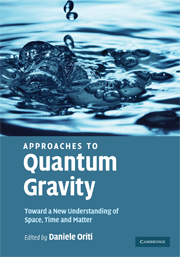Book contents
- Frontmatter
- Contents
- List of contributors
- Preface
- Part I Fundamental ideas and general formalisms
- Part II String/M-theory
- Part III Loop quantum gravity and spin foam models
- Part IV Discrete Quantum Gravity
- Part V Effective models and Quantum Gravity phenomenology
- 22 Quantum Gravity phenomenology
- 23 Quantum Gravity and precision tests
- 24 Algebraic approach to Quantum Gravity II: noncommutative spacetime
- 25 Doubly special relativity
- 26 From quantum reference frames to deformed special relativity
- 27 Lorentz invariance violation and its role in Quantum Gravity phenomenology
- 28 Generic predictions of quantum theories of gravity
- Questions and answers
- Index
23 - Quantum Gravity and precision tests
from Part V - Effective models and Quantum Gravity phenomenology
Published online by Cambridge University Press: 26 October 2009
- Frontmatter
- Contents
- List of contributors
- Preface
- Part I Fundamental ideas and general formalisms
- Part II String/M-theory
- Part III Loop quantum gravity and spin foam models
- Part IV Discrete Quantum Gravity
- Part V Effective models and Quantum Gravity phenomenology
- 22 Quantum Gravity phenomenology
- 23 Quantum Gravity and precision tests
- 24 Algebraic approach to Quantum Gravity II: noncommutative spacetime
- 25 Doubly special relativity
- 26 From quantum reference frames to deformed special relativity
- 27 Lorentz invariance violation and its role in Quantum Gravity phenomenology
- 28 Generic predictions of quantum theories of gravity
- Questions and answers
- Index
Summary
Introduction
Any of us who has used the Global Positioning System (GPS) in one of the gadgets of everyday life has also relied on the accuracy of the predictions of Einstein's theory of gravity, General Relativity (GR). GPS systems accurately provide your position relative to satellites positioned thousands of kilometres from the Earth, and their ability to do so requires being able to understand time and position measurements to better than 1 part in 1010. Such an accuracy is comparable to the predicted relativistic effects for such measurements in the Earth's gravitational field, which are of order GM⊕/R⊕c2 ~ 10−10, where G is Newton's constant, M⊕ and R⊕ are the Earth's mass and mean radius, and c is the speed of light. GR also does well when compared with other precise measurements within the solar system, as well as in some extra-solar settings.
So we live in an age when engineers must know about General Relativity in order to understand why some their instruments work so accurately. And yet we also are often told there is a crisis in reconciling GR with quantum mechanics, with the size of quantum effects being said to be infinite (or – what is the same – to be unpredictable) for gravitating systems.
- Type
- Chapter
- Information
- Approaches to Quantum GravityToward a New Understanding of Space, Time and Matter, pp. 450 - 465Publisher: Cambridge University PressPrint publication year: 2009

